Bungalow house extension – Steps, prices and advice
By Editorial Team
Updated on May 8, 2025

Do you live in a typical Quebec bungalow and feel like the space no longer suits your lifestyle? Maybe your family is growing, working from home is prompting you to rethink your layout, or you simply want to enjoy a more comfortable space. In 2025, extending your home has become an increasingly popular solution, especially given the rising cost of real estate and the expenses involved in moving.
Instead of selling and buying elsewhere, many homeowners are opting to extend their bungalow. This solution, often more economical in the long term, also allows you to stay in your neighborhood while increasing the value of your property.
In this guide, we’ll cover how to carry out an extension step by step, what average costs to expect, what types of projects are possible in Quebec, and which mistakes to avoid.
Why choose an extension over moving?
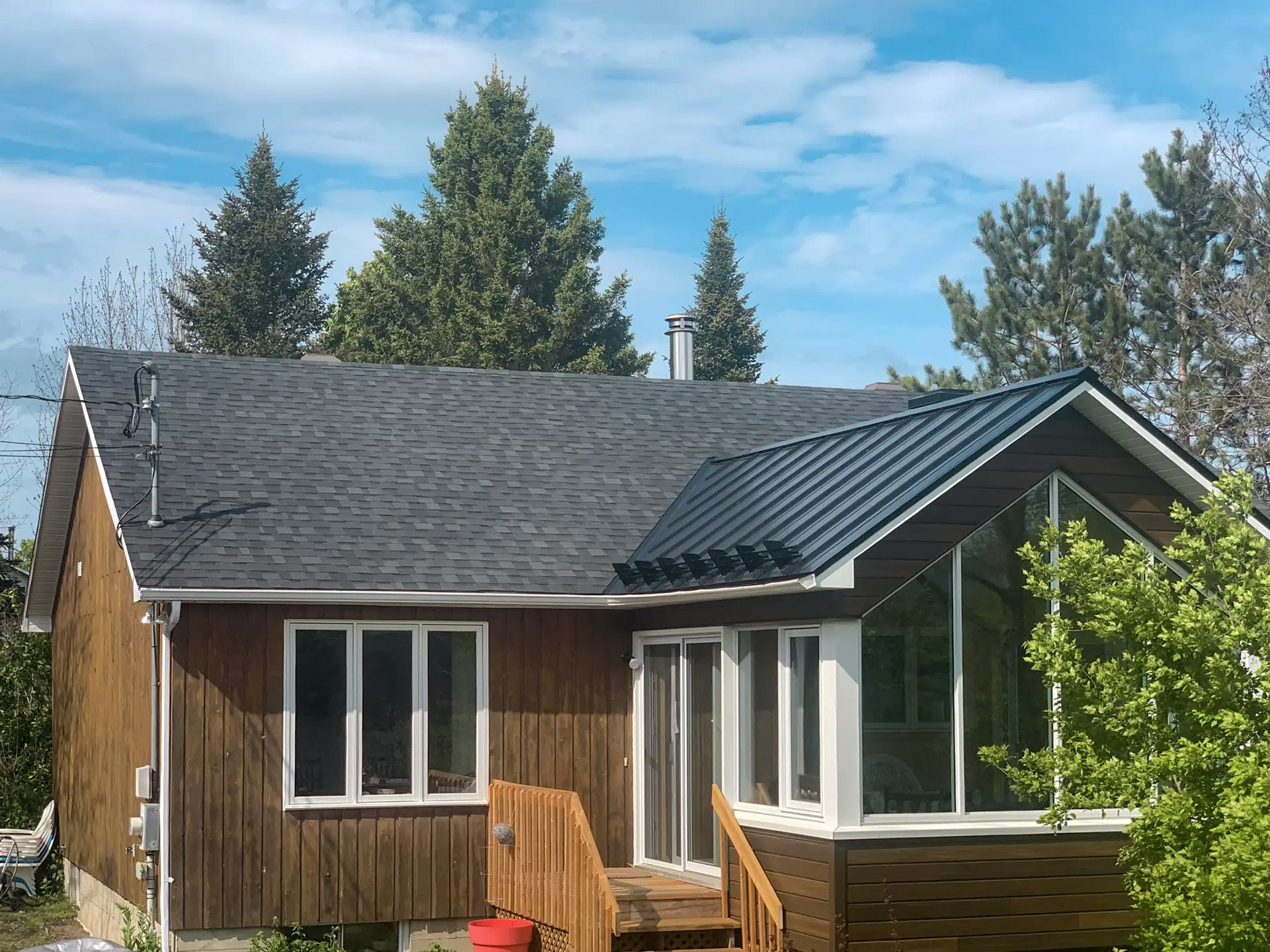
Source : Toitures BroPro Inc
Moving may seem simpler on paper, but it comes with significant expenses: welcome tax, notary fees, moving costs, inspections, and more. Not to mention the stress of changing environments.
What extending a bungalow allows you to do:
Make the most of an already solid and stable foundation
Add long-term value
Customize the new spaces to your taste and needs
Avoid the hassle of moving
Avoid certain costs related to buying a larger home
In this way, extending your home becomes a strategic and sustainable investment.
House Plan: A crucial first step
Every extension starts with a solid plan. It's not enough to want to add a room or a floor—you must first analyze the actual potential of your land, home, and its existing structure.
A well-designed plan helps you avoid cost overruns, permit rejections, or costly design errors. It should include basic elements such as scale, orientation, furniture, and room names.
In addition, this house plan must meet several criteria:
Compliance with minimum setbacks required by the municipality
Maximum height permitted in your area
Authorized building footprint
Coherence with the existing bungalow foundation
Expanding a Home: What are the options?
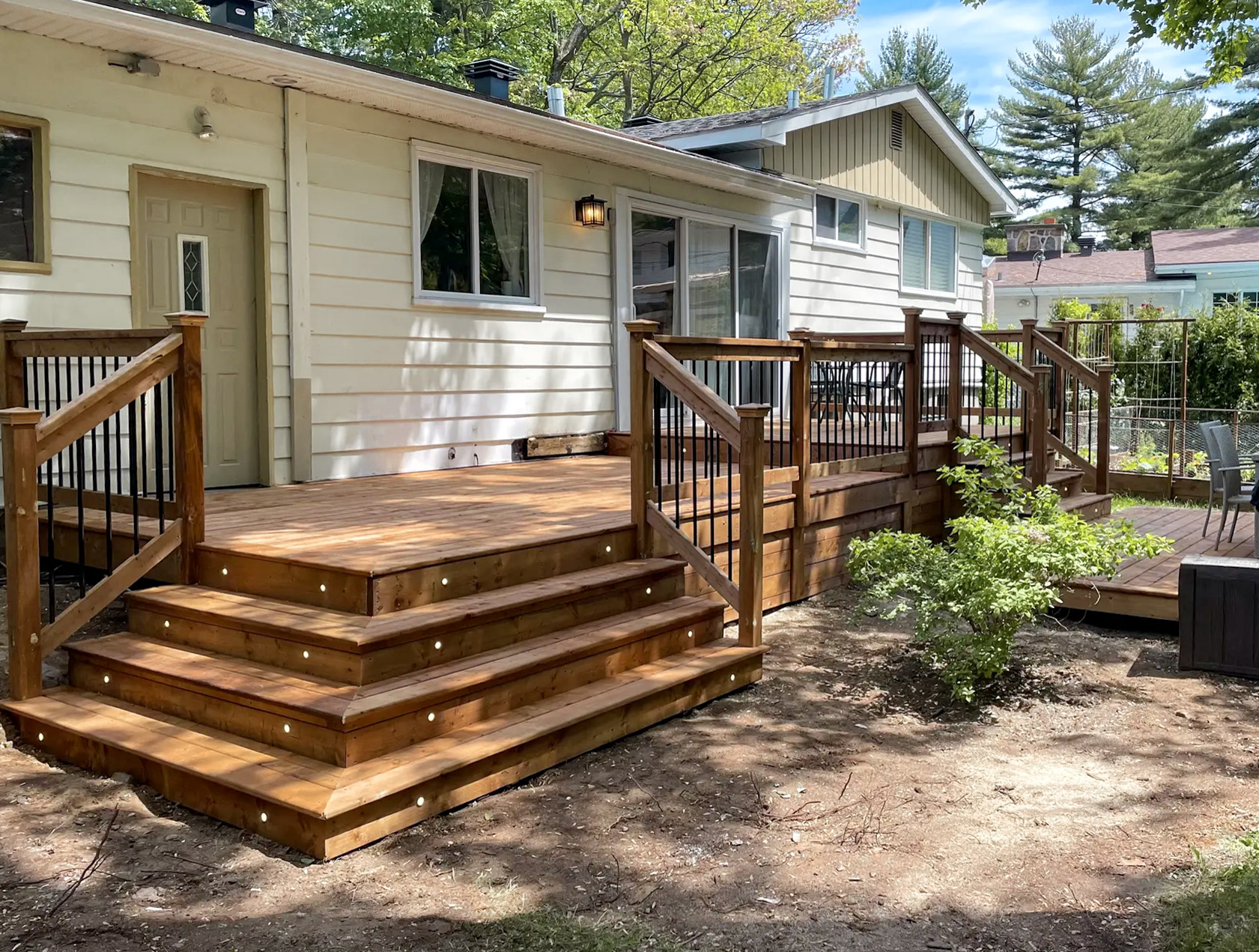
Source : Marinier-rénovations
A bungalow extension can be done in various ways, depending on your needs, your lot, and your budget.
Side Extension
An ideal solution if you have lateral space on your lot. This type of extension lets you add a bedroom, office, family room, or even a garage.
What to know:
The construction is usually built on a new concrete foundation or helical piles
Matching the exterior siding is essential to maintain the home’s aesthetic
The foundation should match the current one
Prices: On average, between $200 and $500/sq. ft.
Pile Foundation Extension
For lighter extensions—like a veranda, three-season solarium, or a simple addition—installing on helical piles is an excellent solution. It avoids full foundation costs.
Advantages:
Less excavation required
Faster construction
Lower costs
Stable on uneven or soft ground
Better ground ventilation
Natural protection against water infiltration
Prices: On average, between $150 and $400/sq. ft. (including construction and finishing)
This is ideal for seasonal projects or small functional additions.
Second-Story Addition
When land is limited, adding a floor allows you to double your living space without encroaching on the lot. This is a popular choice in urban areas but involves major structural work.
What to check:
The condition of the current foundation and base
The load-bearing capacity of the existing walls
Local regulations, such as maximum building height or window positioning
Prices: On average, between $175 and $400/sq. ft., depending on size and finish
Bungalow Before/After Extensions: A game-changing project
Looking at before-and-after photos of a bungalow extension clearly shows the impact it can have: better flow, more light, functional spaces, and a completely revamped façade.
What to anticipate:
An extension also transforms your home’s exterior
The design should remain consistent with the original style
A full update (roofing, siding, windows) is often recommended for a seamless finish
Consult an architect
For example, in the case of a bungalow, a second-story addition is often considered a more sustainable extension solution.
Home extension costs: What to expect in 2025
Here is an estimate of the average costs for a home extension in Quebec this year:
Type of Extension | Estimated Cost (2025) |
|---|---|
Side extension | $200 – $500/sq. ft. |
Rear extension | $200 – $500/sq. ft. |
Full second-story addition | $175 – $400/sq. ft. |
Extension on piles | $150 – $400/sq. ft. (including construction and finishing) |
On average, a turnkey home extension costs between $250 and $400 per square foot.
Prices vary depending on:
The type of foundation or base required
The accessibility of the land
The level of interior and exterior finish chosen
The region of Quebec where you live
The type of bungalow extension you choose
Expert tip: Always request multiple detailed quotes and insist on a clear construction timeline.
Key Steps for a successful bungalow extension
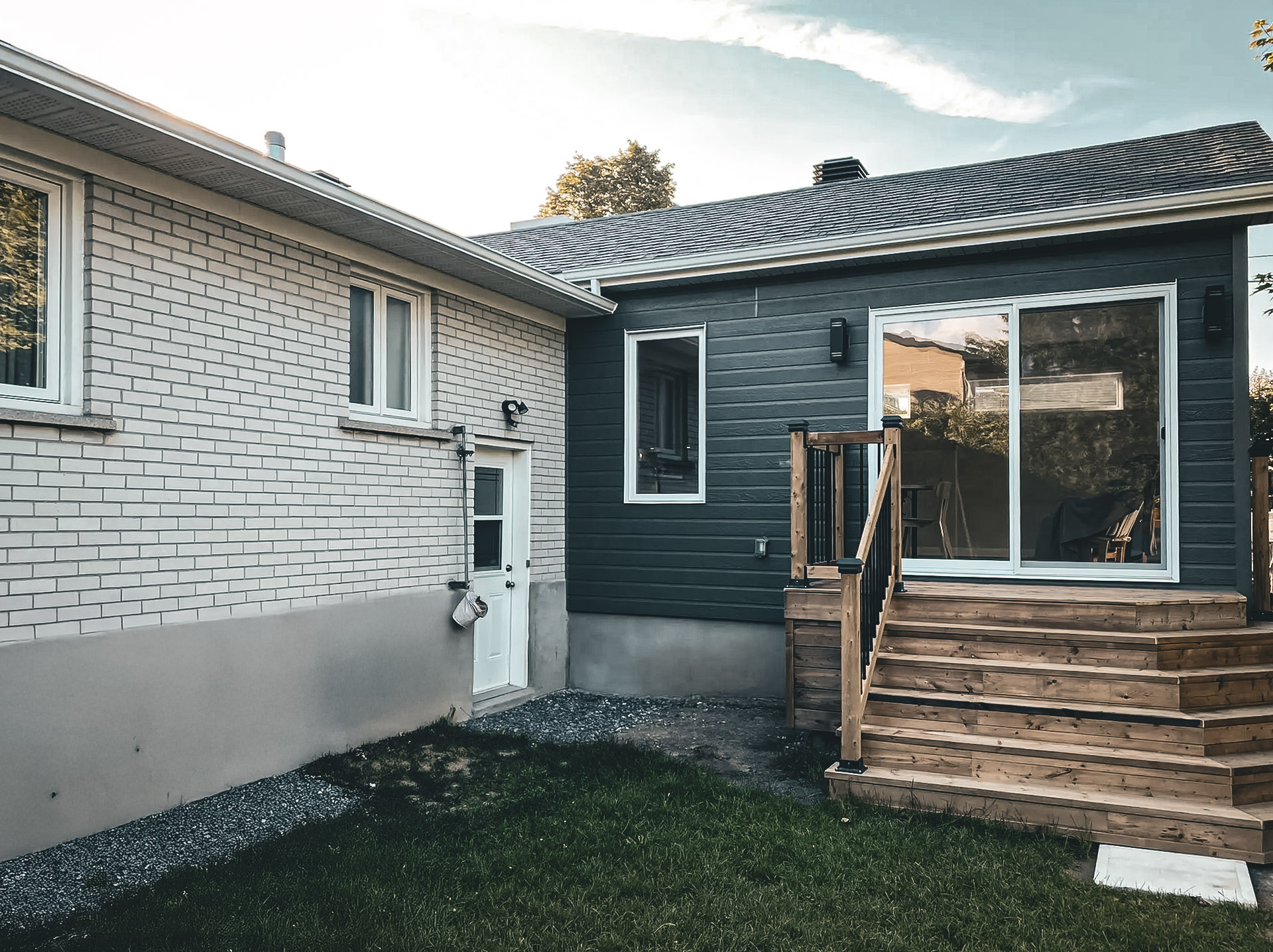
Source : AJG Architecture
To ensure your project is a success, here are the essential steps to follow:
1. Define your needs
Ask yourself the right questions:
Do you want a temporary or permanent bungalow extension?
What will the space be used for? A bedroom, office, or playroom?
2. Check municipal regulations
Every city has its own standards: minimum setbacks, maximum height, authorized square footage, etc.
3. Establish a budget
Consider various financial elements such as personal savings, mortgage refinancing, and credit lines.
4. Design a plan
Hire a professional who can work within the constraints and optimize your available space.
5. Assess the existing foundation
An inspector or structural engineer can confirm if your current foundation can support an addition.
6. Obtain permits
Allow 2 to 8 weeks to receive the necessary authorizations.
7. Choose a contractor
Pick a contractor with an RBQ license, liability insurance, quality materials, and strong references.
8. Complete the work
Depending on the project, the work may take 8 to 16 weeks. Typical steps include:
Excavation or pile installation
Foundation construction
Structural framing
Exterior siding installation
Electrical, plumbing, and ventilation work
Interior finishing
Expert sips for a successful bungalow extension
Prepare a realistic budget. Add 10–15% for unforeseen costs.
Choose durable materials to save on long-term maintenance.
Invest in insulation. A quality thermal envelope saves on heating costs.
Respect the original style of the home. A cohesive extension boosts resale value.
Communicate regularly with your contractor to prevent mistakes or delays.
Conclusion: A transformative project for your home
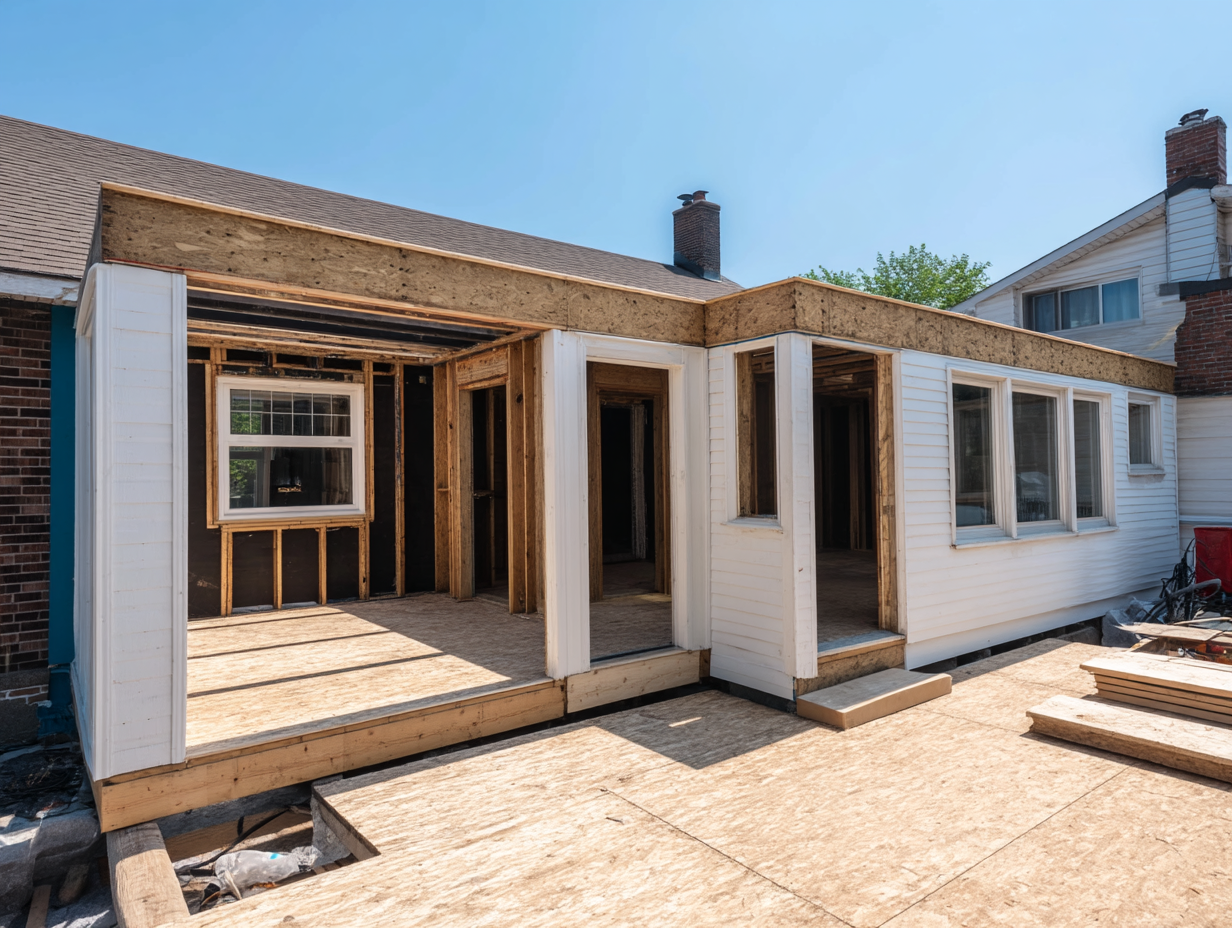
Source : Soumission Rénovation
Extending a bungalow isn’t just about adding square footage — it’s about reinventing your living space. In 2025, more Quebec homeowners are choosing extensions to avoid the costs of moving and to create a home that truly reflects their lifestyle.
A well-planned extension, supported by a solid design, proper foundation assessment, a reliable contractor, and a realistic budget, can dramatically improve your quality of life.
Dreaming of a brighter, more functional space tailored to your family or work needs? This project is within your reach. Whether it’s a second-story addition, a side extension, or a pile-based structure, several options are available.
Take the time to plan carefully, consult local experts, and surround yourself with trustworthy professionals. You’ll be rewarded with a space that grows with you—and increases your home’s value.
FAQ – Bungalow Home Extension
What is the average cost of a home extension in Quebec?
On average, a residential extension costs between $250 and $400 per square foot in 2025. A more complex project like a second-story addition can range from $175 to $400/sq. ft., while a simpler extension on piles may cost between $150 and $400/sq. ft. Prices vary depending on the foundation type, complexity of the work, materials used, and region.
Is a plan required to extend a house?
Yes. Any extension requires a detailed plan—whether for obtaining a construction permit, getting a complete quote, or ensuring compliance with municipal regulations. This plan is typically prepared by a Quebec technologist or architect.
Can a house be extended using piles?
Yes, pile-based extensions are a fast, cost-effective, and reliable solution, especially when the added structure is lightweight. This is ideal for projects like a three-season room, a veranda, or a detached office. It’s also useful in areas with unstable or hard-to-excavate soil.
Is it possible to add a second floor to a bungalow?
Yes, but it requires thorough structural assessment. A second-story addition is one of the most complex types of extensions, as it involves modifying the existing roof, reinforcing load-bearing walls, and sometimes upgrading the foundation. An engineer must confirm the project’s feasibility.
What types of foundations are required?
It depends on the type of extension. A permanent extension typically requires a concrete base (slab or full foundation). For lighter projects, screw piles or a raised platform may suffice. A soil inspection is recommended to guide the choice.
Do I need a permit to extend my home?
Yes. All Quebec municipalities require a permit for any extension, even small-scale projects. The permit usually requires a plan, a basic project description, and compliance with local regulations.
How long does the construction take?
Depending on the project, construction can take between 6 and 20 weeks. This does not include the time needed for planning, producing the plans, and obtaining permits. A well-prepared project tends to run more efficiently.
Is extending more cost-effective than moving?
Often, yes. When you consider notary fees, taxes, moving costs, and the expenses tied to purchasing a new property, extending your current home is generally more affordable—especially if you enjoy your neighborhood. Plus, it lets you design a space that suits your specific needs.
Looking for something else?
Related articles
The latest industry news, interviews, technologies, and resources.

Editorial Team
•06 Jul 2025
You’re running out of space, but why leave that ideal setting where your kids grew up? Since moving out is off the table, building onto your family home seems inevitable. If you happen to find yourself in this situation, you’ve definitely come to the right place! Our article details everything you need to know about building a home extension or addition.

Editorial Team
•28 Jan 2026
In this home adaptation financial guide, we’ll explore the expenses associated with essential home improvements, enhancing accessibility and functionality. How much should you budget to install a wheelchair ramp or upgrade a bathroom? What factors affect the cost of home adaptations? This guide addresses these questions and more, helping you plan your project as efficiently as possible.

Amanda Harvey
•19 Apr 2024
Showering, bathing, hair drying and moist towels hanging from every fixture; all the activities that take place in the bathroom breed humidity.

Cynthia Pigeon
•03 Nov 2025
Regardless of style or material, windows all serve the same purpose: To create an unimpeded view of the outside world and allow one to view its beauty throughout the seasons.
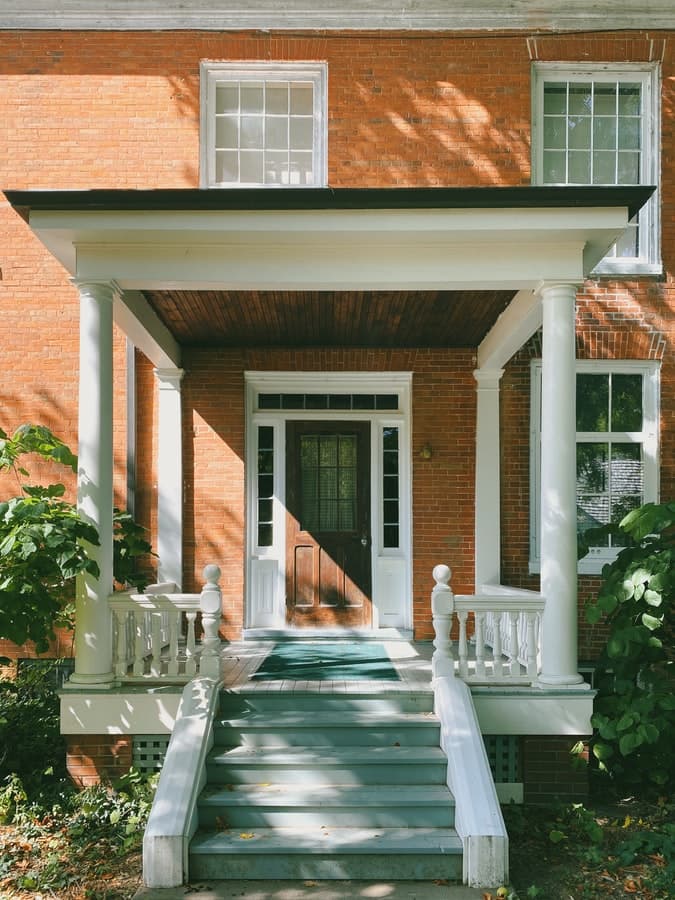
Editorial Team
•08 Nov 2023
Is the exterior siding of your brick house starting to look a little worn? If the idea of bringing it back to its former beauty by restoring it has crossed your mind, you may have considered painting as an option.